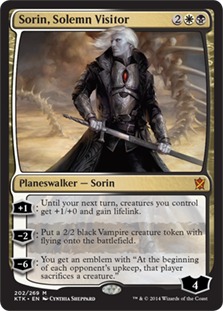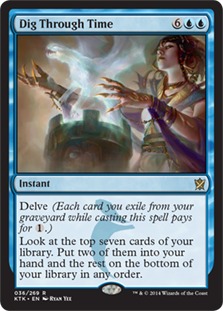Three Weapons of Influence in Magic Finance
A couple years ago I read Influence: the Psychology of Persuasion by Robert Cialdini, marketing professor emeritus at Arizona State. It proved to be one of the only books during my BA program that was important to ordinary, everyday life. Cialdini discusses six principles of persuasion or "weapons of influence" which are used, often unethically, by those in the know against those less educated in marketing and influence.
So today's article is going to be a bit meta. Instead of talking about specific cards to buy or sell, we are going to discuss three of Cialdini's weapons in the context of MTG finance. I should make it clear right from the start, I do not advocate using these weapons unethically by taking advantage of kids and new players, or doing anything else questionable. At the same time, there are many people and companies out there that are more than willing to use these weapons to get you to part with your money. Understanding these psychological principles can influence everything from how you organize your binders to how you approach trading.
Reciprocation
Reciprocation, or in the words of Jeffery Lewis, "Don't let the record label take you out to lunch. Though the fishes seem delicious someone has to do the dishes":
The rule of reciprocation, like all of the weapons of influence, is based in an adaptive behavior. It is a natural and informal way to govern exchanges between to parties: you scratch my back, I'll scratch yours. The trouble is the rule of reciprocation is so strong and overpowering that it can trigger unequal exchanges, especially when the persuading party is intentionally trying to invoke the rule. (Some argue that truly altruistic behaviors or gifts are different in that they are not intended to invoke reciprocity, but it often still does.) This is the psychology behind giving away free samples and it's the reason my grandmother tracks everyone who has sent her a Christmas card in her 72 years of life and returns the favor, even if she hasn't actually talked to the person in decades.
It's easy to invoke the rule of reciprocation, often without even trying, and because of this, intentions really do matter. Say you just finished drafting at your friendly local gaming store. You stick the Flooded Strand you opened into your trade binder, and offer your chaff to a younger, newer player who happened to be in the store that night. This common and simple act of kindness has the potential to invoke the rule.
Now, I'm not saying you shouldn't give away your draft leftovers, because you should (if you want to), but this situation is also is ripe for unethical behavior and abuse. What if the kid opened a Polluted Delta which he/she, like most new players, doesn't value very highly and you think would look nice in your trade binder? What if giving away your worthless leftovers was an attempt to get said kid to "owe you one," potentially getting you a better deal on the Polluted Delta? As you can see, there is a fine line between being nice and doing something that most (and hopefully all) members of the financial community would find unethical.
Another way reciprocity can impact trading is through concessions. For example, you sit down with a trading partner at a GP. You notice a Sorin, Solemn Visitor in his/her trade binder. You've been actively looking to pick up Sorins, so you know this will be the centerpiece of your deal. You also notice your partner checking out a couple of Dig Through Times in your binder. You value the Sorin, Solemn Visitor for $20 and the Dig Through Times at $7.50. If you can make this deal straight up, you are adding value to your binder. So what do you do? Based on the concept of reciprocal concessions, you should pull a copy of Siege Rhino out of your partner's binder and stick it in the pile with the Sorin, Solemn Visitor.
YOURS:


MINE:


Now, you don't expect your trading partner to accept this deal. It's a horrible trade. You made the trade even worse for him! What you are setting up is an opportunity to make a concession by pulling the Siege Rhino from the deal. By making this concession, you are invoking the rule of reciprocation - now your trade partner owes you one. Maybe your partner pays off this debt by saying yes to the Sorin, Solemn Visitor for two Dig Through Times deal, which is what you really wanted anyway. Simply by putting the Siege Rhino into the deal and then making a concession by removing it, your increasing the odds that you partner accepts the deal you really wanted all along.
Authority
Most of us are taught from a young age to listen to authority figures. This is why we pull over when we see flashing lights behind us on the road, cite well-known researchers in term papers, and are more likely to buy a stock on the advice of someone with a title like CEO rather than a random Joe. Even within the MTG finance community there are authority figures. People who, because of the website they write for, or title they have acquired, have a level of power in their words and writings.
The problem here is that authority alone is a weak argument and titles and uniforms can be deceiving. Think about the moon for a minute. I would feel pretty safe listening to what "Mission Commander" Neil Armstrong has to say about the moon because he's actually been there. But what about "Mission Commander" Jim Lovell? While he probably knows more about the moon than I do because of his NASA training, he's never been there. Would you take his statements about the moon as seriously as Armstrong? If you're just looking for a uniform and title, then the answer should be yes, although if you look beyond the authority of the uniform and title, the answers should probably be no.
I'm not saying that you should ignore what the "authorities" in the MTG finance community say, because most of them are very smart and full of wisdom, but its also true that simply having the title of "writer for mtggoldfish, mtgprice, or quietspeculaiton" (and thereby being an authority) does not make someone's opinions valid or mean you should listen to what they have to say.
The cure for this is to look beyond the title and uniform and at the evidence, educate yourself, and come to your own decisions. If I, or anyone else simply says "buy card X, Y, or Z" you should probably either ignore me, or better yet use my statement as a jumping off point for your own research. On the other hand, when someone says, "buy card X - here is the evidence/logic/data that suggests it's a good buy" you should probably take note. I would still encourage you to do your own research and make up your own mind (although, don't exclusively trust yourself either, because of cognitive biases I recently wrote about.)
Scarcity (or what Thomas Sowell calls, "the first lesson of economics.")
So I went in on Titania, Protector of Argoth before Grand Prix New Jersey and now it's time to try to move my 28 copies and turn my wise investment into a profit. Since buylist prices are not great and the spread is weak, I'll be heading to the SCG event this weekend to try to move some copies there and also list some on eBay. So how do I present my Titania, Protector of Argoths to maximize the opportunity of moving them?
While it might seem fun to just fill up a binder with Titania, Protector of Argoths and go to town. The principle of scarcity, based on our deeply ingrained understanding that there are less of good things available and our fear of "missing out," would suggest that I'm probably better off putting only one play set of Titanias in my trade binder, and keep the rest in a deck box in my backpack. Same with eBay, I will not list all seven play sets at once, I'll put them up one at a time.
Rant: Also don't ever list all your copies of card X in a single listing on eBay. I was browsing eBay yesterday, and you would not believe how many people think that selling 30 Disenchants together is going to make the auction more attractive than if they just sold them by the set. Four or 30, it's still a pile of Disenchants. And why would I want seven Soltari Troopers? Maybe I'm trying to buy one and three-fourths of a deck?.
By only having a few copies of Titania, Protector of Argoth staring back at your trade partner (instead of a few pages full), you create a sense of scarcity which increases the odds of someone actually wanting to trade for your cards.
Scarcity is used in all sorts of ways by big MTG vendors. One good example is the "deal of the day" sales, which include both a limited number of copies of the card on sale and a finite time frame in which the customer must purchase the cards - the scarcity double-whammy. By making these cards scarce (whether the scarcity is authentic or manufactured, it really doesn't matter) the vendors are able to increase demand and sell more cards.
Scarcity, reciprocation, and authority are only half of the weapons of influence covered by Cialdini. The other three are liking, commitment, and social proof, but talking about all six together would create an unreasonably long article. Maybe I'll come back to the others in the future. There is a sort of duality with all of these weapons: on one hand you can use them to move your cards, complete your trades successfully, and increase your profits. On the other hand, other people can use them against you. Either way, it is important to not only be aware of how these weapons of influence work, but also how to protect yourself from falling prey to their allure. Here are some of Cialdini's suggestions for resisting the influence of these three weapons:
Reciprocation: Before accepting a free gift or discount, ask yourself if you are going to feel obligated to give something in return. Think about whether the free lunch is actually free.
Authority: Ask yourself, "Am I making this decision because I want to, or because an authority told me to?" Also, ask yourself, "Is this person really an authority, or am I being deceived by the uniform or title?"
Scarcity: Think about whether the scarcity is manufactured or authentic. Listen for sales pitches that say things like, "only a few left" or "time is running out!" Ask yourself, do I really want this item, or am I being caught up in the perceived lack of availability?
That's all for today. As always, leave it in the comments, or @SaffronOlive on twitter.

![Titania, Protector of Argoth [C14]](http://cdn1.mtggoldfish.com/images/gf/Titania%252C%2BProtector%2Bof%2BArgoth%2B%255BC14%255D.jpg)












